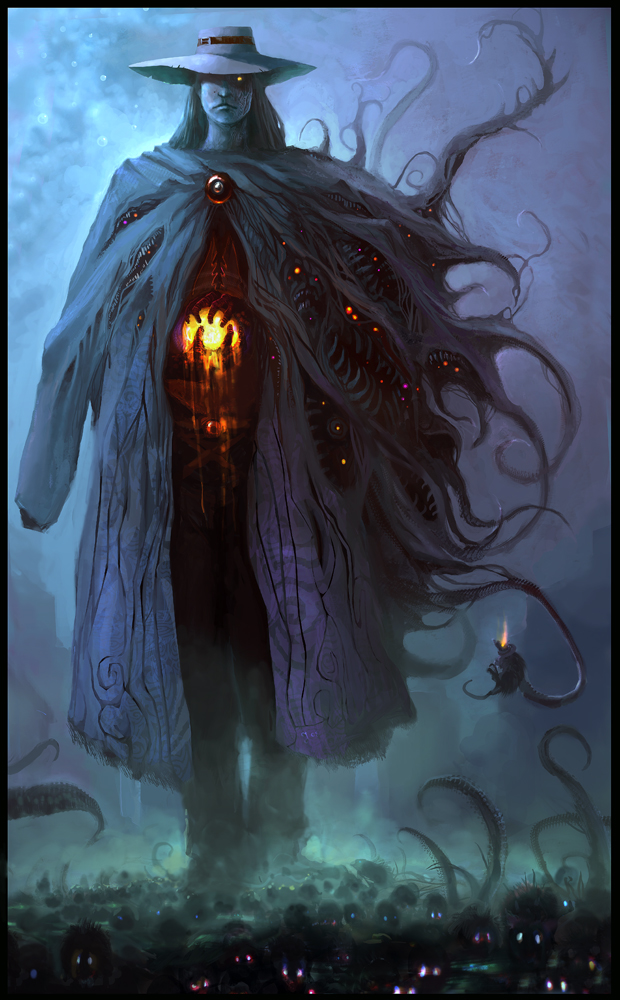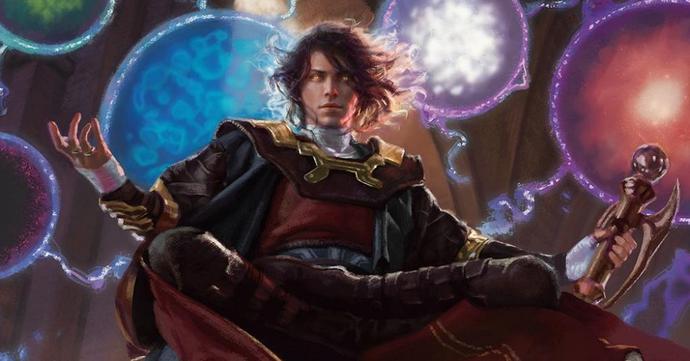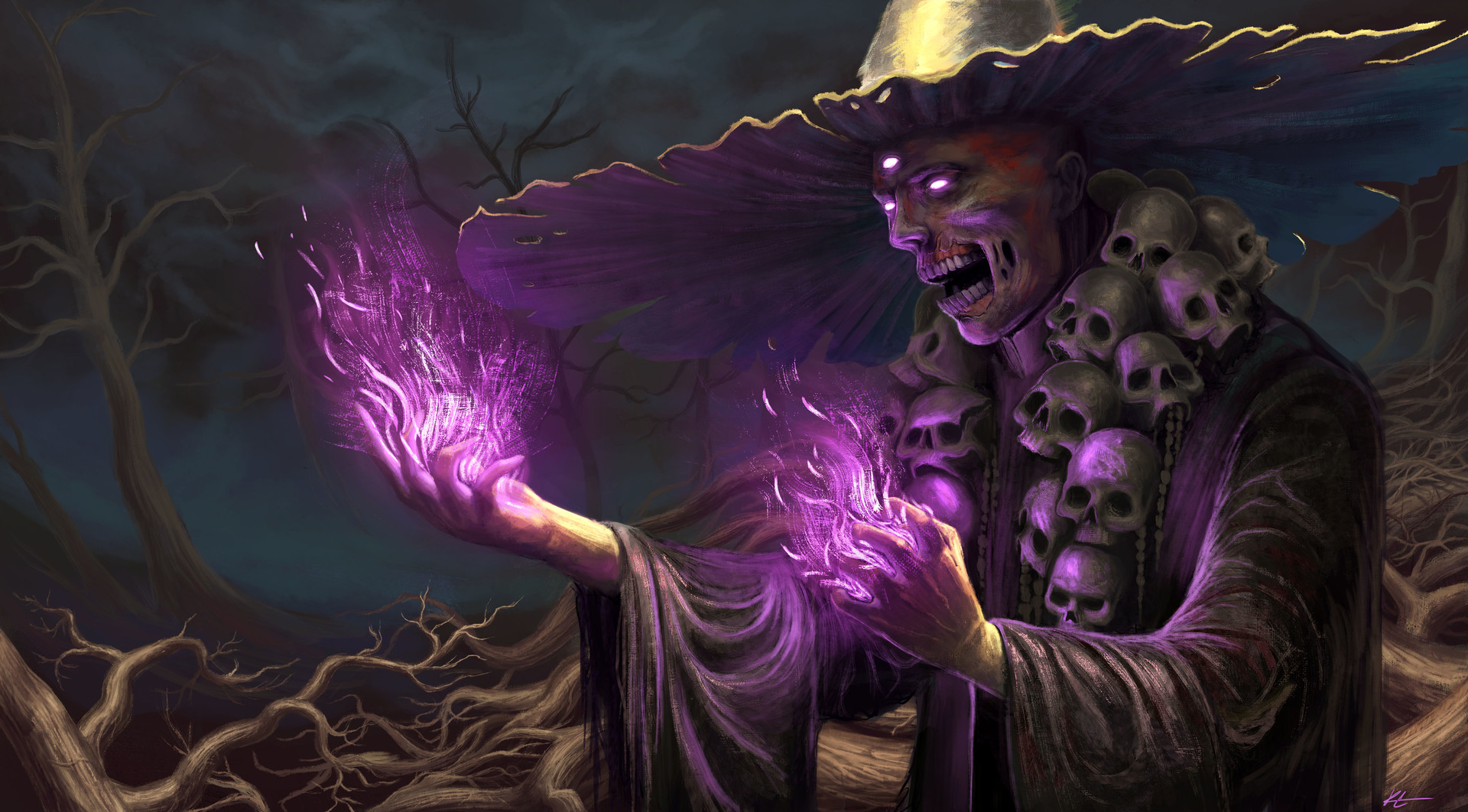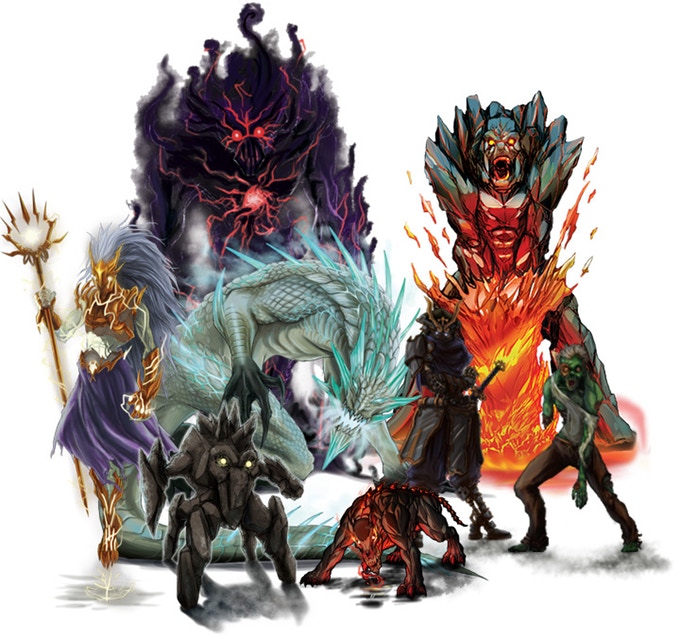Wizard Class
Spellbender
Hit Points
Proficiences
Overview & Creation
Magic was always a mystery, an untold story, that changes from place to place.The spellbenders - are people that are accustomed to many styles, shapes and forms of arcane arts, and finally invented ways to shape and form new possible kinds of spell manifestations. Using the chaotic arcane flows of the ether, spellbenders can be horrible enemies in battles, and very flexible mages outside of the combat.
Class Features
COSMETIC ADJUSTMENTS You have learned to change some of your magical energy by studying your spellbook. You can adjust colors, general appearance, and other harmless effects of your spells and cantrips. Your arcane focus is also able to change form, weight and appearance as well. ARCANE TRADITION When you reach 2nd level, you choose an arcane tradition, shaping your practice of magic through one of 2 ancient traditions: Harbinger or Spellshifter. Your choice grants you features at 2nd level and again at 6th, 10th, and 14th level. ABILITY SCORE IMPROVEMENT When you reach 4th level, and again at 8th, 12th, 16th. and 19th level, you can increase one ability score of your choice by 2. or you can increase two ability scores of your choice by 1. As normal, you can't increase an ability score above 20 using this feature. SPELL MASTERY At 18th level, you have achieved such mastery over certain spells that you can cast them at will. Choose a 1st-level wizard spell and a 2nd-level wizard spell that are in your spellbook. You can cast those spells at their lowest level without expending a spell slot when you have them prepared. Ifyou want to cast either spell at a higher level, you must expend a spell slot as normal. By spending 8 hours in study, you can exchange one or both of the spells you chose for different spells of the same levels. MAGNUM OPUS You construct your own spell.Discuss with DM of what level it will be and what powers will it have.
Starting Equipment
EQUIPMENT
Spellcasting
Asa student of arcane magic, you have a spellbook containing spells that show the first glimmerings of your true power. See chapter 10 PHB for the general rules of spelicasting and chapter 11 PHB for the wizard spell list. CANTRIPS At 1st level, you know three cantrips of your choice from the wizard spell list. You learn additional wizard cantrips of your choice at higher levels, as shown in the Cantrips Known column of the Wizard table. YOUR SPELLBOOK The spells that you add to your spellbook as you gain levels reflect the arcane research you conduct on your own, as well as intellectual breakthroughs you have had about the nature of the multiverse. You might find other spells during your adventures. You could discover a spell recorded on a scroll in an evil wizard's chest, for example, or in a dusty tome in an ancient library. Copying a Spell into the Book. When you find a wizard spell of 1st level or higher, you can add it to your spellbook if it is of a level for which you have spell slots and if you can spare the time to decipher and copy it. Copying a spell into your spellbook involves reproducing the basic form of the spell, then deciphering the unique system of notation used by the wizard who wrote it. You must practice the spell until you understand the sounds or gestures required, then transcribe it into your spellbook using your own notation. For each level of the spell, the process takes 2 hours and costs 50 gp. The cost represents material components you expend as you experiment with the spell to master it, as well as the fine inks you need to record it. Once you have spent this time and money, you can prepare the spell just like your other spells. Replacing the Book. You can copy a spell from your own spellbook into another book—for example, if you want to make a backup copy of your spellbook. This is just like copying a new spell into your spellbook, but faster and easier, since you understand your own notation and already know how to cast the spell. You need spend only 1 hour and 10 gp for each level of the copied spell. If you lose your spellbook, you can use the same procedure to transcribe the spells that you have prepared into a new spellbook. Filling out the remainder of your spellbook requires you to find new spells to do so, as normal. For this reason, many wizards keep backup spellbooks in a safe place. The Book's Appearance. Your spellbook is a unique compilation of spells, with its own decorative flourishes and margin notes. it might be a plain, functional leather volume that you received as a gift from your master, a finely bound gilt-edged tome you found in an ancient library, or even a loose collection of notes scrounged together after you lost your previous spellbook in a mishap. SPELLBOOK At ist level, you have a spellbook containing six 1st-level wizard spells of your choice. PREPARING AND CASTING SPELLS The Wizard table shows how many spell slots you have to cast your spells of 1st level and higher. To cast one of these spells, you must expend a slot of the spell's level or higher. You regain all expended spell slots when you finish a long rest. You prepare the list of wizard spells that are available for you to cast. To do so, choose a number of wizard spells from your spellbook equal to your Intelligence modifier + your wizard level (minimum of one spell). The spells must he of a level for which you have spell slots. For example. if you're a 3rd-level wizard, you have four 1st-level and two 2nd-level spell slots. With an Intelligence of 16, your list of prepared spells can include six spells of 1st or 2nd level, in any combination, chosen from your spellbook. If you prepare the 1st-level spell magic missile, you can cast it using a 1st-level or a 2nd-level slot. Casting the spell doesn't remove it from your list of prepared spells. You can change your list of prepared spells when you finish a long rest. Preparing a new list of wizard spells requires time spent studying your spellbook and memorizing the incantations and gestures you must make to cast the spell: at least 1 minute per spell level for each spell on your list. SPELLCASTING ABILITY Intelligence is your spellcasting ability for your wizard spells. since you learn your spells through dedicated study and memorization. You use your Intelligence whenever a spell refers to your spellcasting ability. In addition, you use your Intelligence modifier when setting the saving throw DC for a wizard spell you cast and when making an attack roll with one.
Subclass Options
| Level | Proficiency Bonus | Features | Cantrips known | sp | e | ll | s | k | n | o | w | n | |
|---|---|---|---|---|---|---|---|---|---|---|---|---|---|
| 1 | 2 | 3 | 4 | 5 | 6 | 7 | 8 | 9 | |||||
| 1st | +2 | Costmetic adjustments,Spellcasting | 3 | 2 | - | - | - | - | - | - | - | - | |
| 2nd | +2 | Arcane tradition | 3 | 3 | - | - | - | - | - | - | - | - | |
| 3rd | +2 | ---- | 3 | 4 | 2 | - | - | - | - | - | - | - | |
| 4th | +2 | Ability score improvement | 4 | 4 | 3 | - | - | - | - | - | - | - | |
| 5th | +3 | ---- | 4 | 4 | 3 | 2 | - | - | - | - | - | - | |
| 6th | +3 | Arcane tradition | 4 | 4 | 3 | 3 | - | - | - | - | - | - | |
| 7th | +3 | ---- | 4 | 4 | 3 | 3 | 1 | - | - | - | - | - | |
| 8th | +3 | Ability Score improvement | 4 | 4 | 3 | 3 | 2 | - | - | - | - | - | |
| 9th | +4 | ---- | 4 | 4 | 3 | 3 | 3 | 1 | - | - | - | - | |
| 10th | +4 | Arcane tradition | 5 | 4 | 3 | 3 | 3 | 2 | - | - | - | - | |
| 11th | +4 | ---- | 5 | 4 | 3 | 3 | 3 | 2 | 1 | - | - | - | |
| 12th | +4 | Ability Score Improvement | 5 | 4 | 3 | 3 | 3 | 2 | 1 | - | - | - | |
| 13th | +5 | ---- | 5 | 4 | 3 | 3 | 3 | 2 | 1 | 1 | - | - | |
| 14th | +5 | Arcane tradition | 5 | 4 | 3 | 3 | 3 | 2 | 1 | 1 | - | - | |
| 15th | +5 | ---- | 5 | 4 | 3 | 3 | 3 | 2 | 1 | 1 | 1 | - | |
| 16th | +5 | Ability Score Improvement | 5 | 4 | 3 | 3 | 3 | 2 | 1 | 1 | 1 | - | |
| 17th | +6 | ---- | 5 | 4 | 3 | 3 | 3 | 2 | 1 | 1 | 1 | 1 | |
| 18th | +6 | Spell mastery | 5 | 4 | 3 | 3 | 3 | 2 | 1 | 1 | 1 | 1 | |
| 19th | +6 | Ability score improvement | 5 | 4 | 3 | 3 | 3 | 3 | 2 | 1 | 1 | 1 | |
| 20th | +6 | Magnum opus | 5 | 4 | 3 | 3 | 3 | 3 | 2 | 2 | 1 | 1 |













Comments